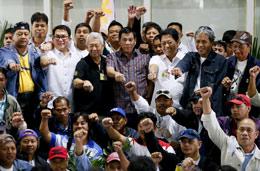Duterte keeps bank election promise

Filipino-Canadians and migrant workers are hailing the move by the Duterte administration to establish an Overseas Bank for Filipinos (OFB), that will provide specialized financial and loan services.
The bank would start operation in early 2018, announced Secretary Silvestre Bello of the Department of Labor and Employment in Manila stressing that it would not only serve the OFWs but also Filipino expatriates who are “contributing a lot to the Philippine economy.”
“This has the potential to significantly lower the remittance costs of Filipinos overseas,” said Francis DeLima, a migrant worker in Surrey, BC.
“I have heard many complaints about banks and money-transfer companies charging exorbitant fees,” said the father of two, who sends most of his pay cheque back to his family in Cagayan de Oro.
Vancouver hotel worker, Leila Silva said she hopes that sending money through the new bank OFB would be safer, cheaper, and convenient.
“If they have lending service maybe I can apply for a loan to start a small business in my hometown,” said Silva.
Media reports in the Philippines showed most of the organizations speaking on behalf of Filipinos overseas also congratulating President Rodrigo Duterte for the ove.
Duterte, keeping to an election promise, signed Executive Order 44, approving the Land Bank of the Philippines' acquisition of Philippine Postal Savings Bank, and convert it into the OFB.
iDOLE, or the identification card for OFWs in place of the Overseas Employment Certificate, can be used for OFB transactions, officials aid.
There are 10.2 million Filipino workers worldwide as of 2013, according to the latest estimate of the Commission on Filipinos Overseas. Latest data from the Central Bank show that OFWs have pump about US$30 billion in cash remittances annually.
For his part, Bello said the OFB also aims to deliver efficient services in the foreign remittances of overseas Filipinos.
Bello could not say exactly how much the OFB would charge as fee the OFW remittances to their families back home but assured it would be “much cheaper.”
According to Bello, the OFB would take over the 116 PosBank branches throughout in Philippines even as he revealed the government would also set up outlets in the country’s labour offices abroad.
He also revealed he would insist that three OFW representatives be included in the OFB board, instead of one, to signify the government’s recognition of their valuable contributions especially to the economy.
Officials said the establishment of the OFB was the latest of the government’s determined attempt to promote the defense and welfare of overseas Filipinos.
Among others, Bello said the government has set up “one-stop shops” in key cities and towns where OFWs can transact business instead of the practice of forcing them to go from one office to another, for example, to get needed documents, thus saving them time and expenses.
Remittances to Asian countries like China, India, Thailand, the Philippines and others have been growing dramatically in recent years.
Markets are reporting high levels of money transfers to developing countries. The World Bank reported that the 2015 value of remittances to developing countries amounted to $431.6 billion, up 0.4% from 2014 figure of $430 billion. India remained in pole position at $69 billion in remittances in 2015, $1 billion less than the 2014 figure.
The world's second largest economy, China received an incredible $64 billion in remittances in 2015, followed by the Philippines in a distant third with $28 billion.






